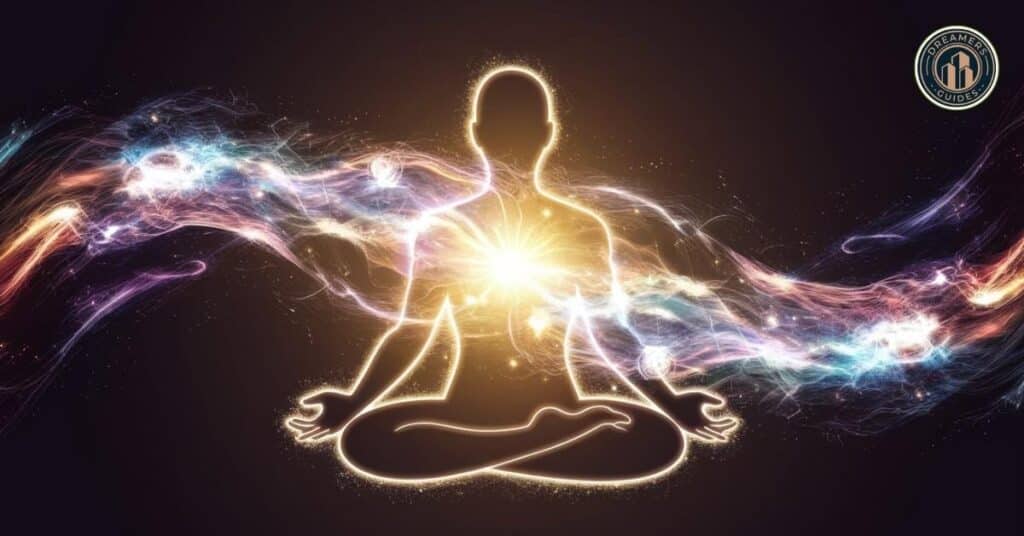The absence of dreaming can feel like a peculiar experience, making you question its spiritual significance. The spiritual meaning of not dreaming often suggests a period of introspection, where the subconscious mind is urging you to seek clarity and balance in your waking life. Many believe dreams act as a gateway to mystical realms, offering insights into our unconscious mind.
But what if there are no dreams at all? Some say this predicament signals a deeper inner shift. For centuries, people have explored the interpretation of dreams, yet the lack of them carries its own allure.
It might mean your mind is at peace, free from unresolved desires and fears. Others think it blocks access to hidden messages meant to guide personal growth.
Many find fascination in the way dreams intertwine with human experiences, but their absence could be just as revealing. Some say it’s a sign of spiritual clarity, while others see it as missing a vital connection to deeper worlds.
Throughout history, different cultures have viewed it as either a blessing or a challenge. Whatever the case, not dreaming doesn’t mean you’re disconnected, it might simply mean your realm of awareness has shifted beyond the need for nightly visions.
Definition of Dreams and Their Significance
Dreams are often seen as windows into our subconscious ethereal realms where emotions, thoughts, and aspirations unfold. In these vivid states, the mind processes repressed memories, conflicts, and unresolved issues from the day.
Sleep acts as a time for our subconscious to communicate, offering insights into hidden desires and fears. Dreams reveal fragments of what is deeply buried within us, often providing valuable reflections that can help us confront or understand ourselves more deeply.
In many cultures and throughout history, dreams have been seen as divine messages or conduits to greater realms of awareness.
While some may experience fleeting dreams, others recall them vividly. The significance of these nightly adventures lies in how they relate to our waking lives. As our minds continue processing emotions, dreams may be a narrative of our daily experiences, weaving together imagery that provides insights into our inner worlds.
Psychology tells us that dreams help organize thoughts, but spiritually, they can be a bridge to communication with the divine or our own deeper consciousness. When we don’t dream, it could suggest we are in a state of balance or in the process of resolving internal struggles.
Curiosity about the Absence of Dreams and Its Spiritual Meaning

The absence of dreams can spark deep curiosity. When we go through slumber without experiencing the usual dream journeys, we may wonder if there is something more to this state.
Many cultures see dreams as a sacred dimension, offering guidance and messages from ancestors or even a higher world. Some believe dreamlessness indicates a connection to realms beyond the physical, a space where we explore deeper parts of ourselves.
This state may seem like a natural part of life, yet it raises important questions. Are we perhaps perceiving something more spiritual that guides our inner purpose? The spiritual meaning of not dreaming may indicate a need to reconnect with your inner self and align with your spiritual path.
Dreamlessness could be a way for the mind to navigate experiences and emotions more consciously without the distraction of frequent dreams. It might also suggest we are currently in a balanced state, where we no longer need to process repressed feelings or conflicts.
Some see it as a form of spiritual play, allowing the innate connection between the physical and spiritual worlds to shift. This absence might even offer the space to develop greater connections to our higher self, helping us to ponder life’s meaning in a different way.
The Nature of Dreams
Unraveling the Mystery: An Explanation of the Dreaming Process
Dreams are often a collage of fragmented scenes, imagery, and sensory input. When we fall into slumber, our brain enters the REM stage, where we experience heightened brain activity.
This phase is like a movie, where our thoughts, emotions, and memories play out, sometimes defying the rules of ordinary reality. Researchers believe this process helps us process desires, conflicts, and experiences that our conscious mind struggles with during the day.
However, for some, this mystery of dreams can cease. The absence of dreams could signal that the mind is no longer processing input or is in a more disconnected state. The spiritual meaning of not dreaming could symbolize a temporary disconnection from your intuition or inner guidance.
The fascination with dreams often comes from their ability to manifest our deepest desires, fears, and thoughts in ways that seem logical but feel eccentric and mysterious.
When dreams don’t appear, it can feel like something is missing, a journey has stopped, or the brain is at rest. This lack of dreams might represent a time when we are no longer processing unresolved emotions, or when our minds are free from the rapid pace of daily life.
It can be a sign of balance or simply a phase where the ethereal world has taken a break.
The Multifaceted Purpose: Dreams in Psychology and Spirituality
Dreams serve as a bridge between the unconscious and waking realities, offering a unique space for both psychologists and spiritual practitioners to explore the mind. From a psychological perspective, dreams can help with emotions and memory consolidation, acting as a tool for the integration of unresolved conflicts.
They allow individuals to explore symbolic meanings and processes that are often hidden in the subconscious. In spirituality, dreams are seen as messages or guidance from the divine, offering profound insights into one’s self-discovery or journey.
This exploration of the psyche brings clarity, sometimes in the form of fantastical or enigmatic imagery, offering perspectives on life’s purpose.
For individuals seeking understanding, dreams act as a channel to deeper realms of knowledge, where the mind can access hidden truths. In certain cultures, dreams are viewed as a reflection of the spiritual world, a tool for unlocking the mysteries of existence.
Whether drifting through realities or experiencing vivid sequences, dreams provide insights that can guide self-discovery and illuminate the path toward personal growth.
When dreams cease, it can feel like a loss of connection to both the subconscious and spiritual realms, leaving a profound curiosity to explore what might be missing.
Possible Reasons for Not Dreaming
Biological factors that may affect dream recall
Biological factors play a huge role in whether or not we remember our dreams. Our sleep cycles are essential in this process. During REM (Rapid Eye Movement) sleep, dreams occur and are usually more vivid.
However, if these sleep cycles are disrupted, such as from insomnia or sleep apnea, it can lead to diminished dream recall. People with restless nights may find their dreams faded or hard to remember when they wake up.
Even the use of certain medications like antidepressants or sedatives can interfere with REM sleep, which is crucial for recalling dreams. These drugs can sometimes cause dreams to be suppressed, leaving us with little to no recall upon waking.
Additionally, biological factors such as stress or poor sleep quality can also influence the intensity and vividness of our dreams. When we experience disturbed or difficult sleep, our subconscious may be hindering dream recollection, making it harder to have a complete memory of our nightly experiences.
The patterns in our sleep and how deeply we rest affect our ability to recall dreams in the morning. For some individuals, it may even become difficult to recall dreams at all, as the factors mentioned above impact their ability to enter the necessary sleep stages for vivid dreaming.
Age-related changes in dream patterns
As we age, our dreaming patterns naturally change. For many individuals, the frequency and intensity of dreams decline, and this can be due to physiological factors like hormonal changes.
The structure of sleep, including the REM stage where dreams occur, often undergoes alterations. Scientists have found that as we get older, the duration of dreaming periods may decrease, impacting how vivid or frequent our dreams are.
These changes are part of a natural transformation in our sleep cycle and perception. The impact of age on dreaming shows that this is a vital process connected to our overall life journey and awareness.
Read More : Decoding Dreams: Biblical Meaning of a Ram’s Appearance
Psychological factors influencing dream recall
Our subconscious plays an essential role in shaping the content of our dreams, but stress and anxiety can suppress their recollection. When the mind is overwhelmed with emotional burdens, it may push certain memories away, making recall difficult.
Repressed thoughts and trauma can also act as factors that block understanding, causing dreams to fade upon waking. Some people may even ignore their dreams unknowingly, which further weakens their ability to remember them over time.
Nightmares and vivid, unsettling dreams often hold symbols and metaphors that reflect deeper emotional struggles. The mind may find untangling these meanings challenging, leading to their suppression.
Disorders related to sleep and biological changes, such as age-related shifts, can also have an impact on dream remembrance. Since dreams act as a manifestation of inner thoughts, unresolved issues may influence their charge and clarity, making recall harder.
Spiritual Interpretations for Not Dreaming

Connection to Higher Consciousness or Spiritual Growth
For some individuals, the absence of dreams may indicate a deeper connection to higher realms and heightened awareness. When the mind has moved beyond the need for symbolic messages, it can mean a shift in spiritual growth.
This change in perception suggests that one has ascended to new stages of consciousness, where dreaming is no longer necessary for understanding. Some believe this shift helps them become more attuned to a universal language, allowing them to transcend traditional viewpoints and explore new states of being on their journey.
Ascended States Beyond the Need for Dreams
When individuals have entered ascended states, they may find themselves detached from the need for dreaming. In this elevated state, the subconscious no longer needs to communicate through symbolism or emotions.
The mind has transcended past the limitations of ordinary dreams and is now more aligned with pure awareness. This process of spiritual evolution allows them to access higher levels of consciousness.
With these experiences, one may feel they are no longer bound by the typical concept of dreams, having reached a state where they are free to experience spiritual growth beyond the traditional path. Experiencing no dreams might carry a spiritual meaning, urging you to quiet your mind and seek spiritual renewal.
Focusing on Present Moment Awareness
When you reach a state of deep awareness, your focus shifts from dreaming to fully embracing the present moment. In this spiritual process, your mind transcends the limitations of the subconscious and becomes more aligned with pure experience.
At this level, the need for symbolism in dreams fades away, and you may feel detached from the habitual patterns of thought. Instead of relying on dreams to understand your emotions or thoughts, you enter a space where you are no longer bound by old concepts or the path of past experiences.
This shift allows you to evolve spiritually, reaching a higher level of awareness and inner peace.
Alignment with Eastern Philosophies
Embracing Emptiness and Non-Attachment
In many Eastern teachings, such as Buddhism and Taoism, the practice of letting go of attachments is key to attaining enlightenment. When you embrace emptiness and non-attachment, you free yourself from the distractions of everyday life, including desires and expectations.
This aligns your mind with a state of clarity, where dreaming becomes less important. As you align with this mental state, you may notice that experiences no longer carry the weight of attachment, and you feel more at peace, no longer driven by the need for external validation or symbolic messages.
For many, this path marks the beginning of deeper spiritual growth, where you are no longer bound by past thoughts or attachments.
Mastery Over the Mind Through Meditation
Through the practice of meditation, individuals can achieve mastery over the mind and experience a state of profound inner tranquility. This practice leads to mental clarity, allowing one to transcend the usual distractions of thoughts and sensory input.
As you deepen your mindfulness and understanding, your awareness reaches a higher state, where dreams may no longer hold the same resonance. By quieting the mind, you access pure consciousness, leaving behind the interpretations and symbolism found in dreams.
In this serene state, growth and spiritual journey unfold, free from the need for external distractions or dreams. This heightened awareness offers personal growth and opens new paths of understanding.
Read More : The Spiritual Meaning of Itching Ears: What Your Body Might Be Telling You
Exploring Alternative Forms of Dreaming
Lucid dreaming as a conscious alternative to traditional dreaming
Lucid dreaming offers a deeper level of awareness where individuals can consciously engage with their dreams. In this state, you can manipulate the dream world, allowing for adventure and exploration beyond typical dreaming.
Many people use lucid dreaming to receive messages or insight from their spirit guides or even deceased loved ones. This experience provides a unique opportunity for reflection and self-analysis, which can lead to greater enlightenment.
By practicing techniques like journal keeping or questioning the nature of the dream, one can enhance their connection to higher consciousness. Lucid dreaming helps individuals access different levels of consciousness and enjoy the experience of exploring physical and spiritual realms.
Daydreaming as a potential substitute for nighttime dreams
Daydreaming can serve as a spiritual substitute for traditional dreams, allowing the mind to wander and explore possibilities while awake. Through visualization and imagination, individuals can tap into their desire for transformation and manifestation, using these dreams to guide their purpose and career.
Daydreaming often leads to self-reflection and insights into emotional or spiritual matters, offering a unique form of introspection. This creative process can help uncover new revelations or creative ideas that influence personal growth.
By journaling these thoughts, individuals can test their unconscious thoughts and connect to their deeper desires, providing a pathway for both creativity and personal transformation.
Seeking Guidance from Spiritual Practitioners or Experts

Consulting with psychics, mediums, or clairvoyants
The absence of dreams can sometimes be seen as a signal to seek guidance from spiritual practitioners like psychics, mediums, or clairvoyants. These intuitive individuals often help connect you to departed spirits or spirits that may provide messages through channeling or extrasensory perception.
If your energy field feels shifted, or you’re struggling with dreamlessness, consulting with a medium can bring comfort and help uncover underlying messages from the subconscious or external forces.
In this journey, psychic practitioners provide insights and interpretations of your spiritual state, guiding you to understand your dream states and the deeper meanings behind your current perception of reality.
Insights into the absence of dreams from a metaphysical perspective
From a metaphysical point of view, the absence of dreams may indicate an imbalance in your energy centers or chakra system. When there is a disruption in the cosmic energies surrounding you, such as planetary alignments or shifts in your birth chart, it can affect your ability to dream.
This imbalance may also point to a need for personal growth or a rebalance in your life path. Many spiritual practitioners believe that dreamlessness is a sign of needing to connect more deeply with your spiritual journey.
Techniques like Reiki, numerology, or energy healing can help restore a harmonious flow in your energy and lead to a clearer connection with the deeper aspects of your consciousness.
Astrology and numerology also play a significant role in these interpretations. If certain numbers or celestial patterns appear, they may offer insights into your personal numerological blueprint and show where you are in your spiritual transformation. Working with spiritual practitioners can help uncover these symbols and offer clarity on how to navigate your spiritual path, leading to a more harmonious and balanced life.
FAQ’s
What does it mean spiritually if I don’t dream?
Spiritually, not dreaming may indicate a need for deeper personal growth or a shift in your spiritual journey. It could suggest that you’re disconnected from your subconscious or need to rebalance your energy centers.
What does not dreaming indicate?
If you’re not dreaming, it might reflect emotional imbalances or a lack of connection to your inner self. This absence could also signal that you’re spiritually evolving or need time to recharge.
What does it mean when you have no dreams?
Having no dreams may suggest you’re in a state of transformation or experiencing a shift in your life path. It can also mean you’re not processing emotional or mental experiences during sleep.
What is the spiritual meaning of dreamless sleep?
Dreamless sleep can symbolize spiritual rejuvenation or a disconnect from the material world. It may point to a deeper state of awareness, where you’re not focused on the subconscious mind or are in a phase of spiritual growth.
Read More : Unlocking the Mysteries of Snake Dreams: A Biblical Perspective
Conclusion
The spiritual meaning of not dreaming may signify an important shift in your life. It could indicate that your mind and spirit are in a state of balance, no longer needing dreams to process emotions or desires.
This absence of dreams might also suggest spiritual growth, where your awareness transcends the need for nightly visions, guiding you to higher consciousness. Many spiritual practitioners see this as an opportunity for deep inner transformation and alignment with your true self.
If you’re experiencing a period of dreamlessness, it’s important to embrace it as a sign of clarity and growth. Consider using techniques like meditation or energy healing to reconnect with your deeper consciousness.
If this state persists, seeking advice from spiritual practitioners can help you understand how to navigate your spiritual journey more effectively. Allow this time to unfold your spiritual transformation and open new pathways to self-awareness.